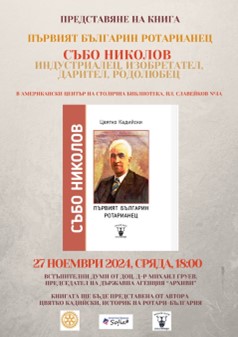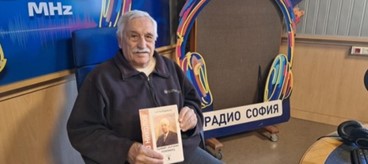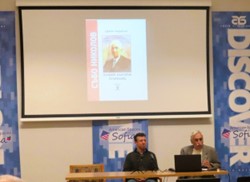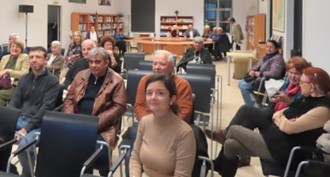At the American Center of the Sofia City Library, a biographical book about the first Bulgarian Rotarian, Sabo Nikolov, was presented. The book was written by the historian of Rotary International District 2482 – Bulgaria, Tsvyatko Kadijski.
The book was published on the initiative of the Rotary Club of Panagyurishte, Nikolov's hometown, with the active participation of the club’s president, Stoyan Hristov.
Bulgarian Rotarians gratefully welcomed the hosting of the event by the American Center in Sofia, which enabled the large audience to learn about the life and work of this extraordinary individual and his contribution to development.
At the beginning of the evening, Stoyan briefly shared how the idea of writing a book about this remarkable son of Panagyurishte came about. Following this, Tsvyatko introduced the audience to many new details, previously unknown to the Bulgarian public, about the story of this semi-literate orphaned farmhand who left for America at the age of 16.
Through hard work, Sabo Nikolov earned an education at the Worcester Polytechnic Institute. In the Institute's Yearbook for the Class of 1896, it is written: "He is the only Bulgarian we know. But if all his compatriots are like him, then Bulgarians are very good people." He gained practical experience at Norton Company and rose to the position of senior partner and vice president of the renowned engineering company Leland-Gifford. He invented an exceptionally precise method for grinding machine parts.
In 1917, he patented a belt for power transmission in metal-cutting machines, which today is of great interest to collectors. A respected citizen, enterprising industrialist, philanthropist, and benefactor for numerous public causes in Worcester and Putnam, he lived there until the end of his life. For his donation of over $100,000 to Worcester Polytechnic Institute, he was honored with the title of "Founder-President." He was regularly elected as a trustee of the Worcester Academy of Mathematics and Science.
For the Worcester Trade School, he established the annual "Sabo Nikolov Award."
Sabo Nikolov was the initiator and donor behind the construction of the airport, the radio station, and the nurses’ home in Putnam. He also donated a plot of land for the construction of the city’s water reservoir. Nikolov was a member of the Putnam Chamber of Commerce. For us Bulgarians, it is heartwarming to learn from the records of the Chamber's re-election board on May 26, 1926, that the participants were captivated by a Bulgarian folk song performed by Sabo Nikolov himself.
What could Sabo have been thinking as he sang that night? Could the semi-literate orphan who once herded flocks near Karaglar, chopped wood for Pastor Marsh in Plovdiv, cared for Pastor Sleeper’s luggage on his journey to America, worked for meager pay just to learn a trade, took out loans, and sold books to complete his higher education, have ever imagined that he would one day stand as an equal before the elite of Massachusetts and be invited to sing a song from his small, impoverished Balkan homeland?
What was Sabo thinking when he sang her that night? Was it the semi-literate orphan who had herded near Karaglar, chopped wood for Pastor Marsh in Plovdiv, cared for Pastor Slipper's luggage on the way to America, worked for a pittance, only to learn a trade, took out loans and sold books to get a college degree ever imagined that he would stand before the Massachusetts elite as an equal and be invited to sing them a song from the poor little Balkan country?
He married Grace Durfee, by father a direct descendant of the pilgrim Thomas Durfee, who arrived in 1620 in New England on the ship Mayflower It is a great honor for Szabo that, as part of the family, his name appears in a seminal reference work in U.S. history, the "Index to Mayflower Descendants" (the only English name in there!).
A great lover of motoring, the ingenious American inventor and designer "Uncle Henry" (Henry Leland, with whom he had a close business and personal relationship) specially designed a custom Cadillac for him. Among the many innovations are folding seats that can turn a coupe into a bedroom - something that didn't appear in mass production until several decades later. A new, previously unknown aspect of Szabo's life is his passion for travelling.
He is a tireless traveller - he has toured the Pacific coast of the USA, Canada and Mexico, the Caribbean, South America, the Mediterranean, on expeditions to Greenland, Spitsbergen, Iceland. His film about Lapland was a great success in the USA.
The book also includes the Rotary history of Sabo Nikolov. He was the first Bulgarian Rotarian (admitted to the Worcester Rotary Club, USA, in 1915). As the president of the Putnam Rotary Club (where he moved in 1923), he represented the club at the 25th Jubilee Convention of Rotary International in Chicago in 1930. He worked tirelessly to promote and develop Rotary in Bulgaria and to represent the country in the global Rotary community.
Sabo Nikolov passed away in 1957 in the USA and was buried in the family tomb of the Durfee family in Putnam.
The reader also learns about his contributions to Bulgaria's development. He financially supported Bulgarian students in the USA, Germany, and France. Among them was the remarkable Bulgarian scientist, public figure, and Rotarian Dimitar Atanasov, the last president of the Sofia Rotary Club before its ban in 1941. Through his donation, the Phytopathological Laboratory and the Vegetation House at the Agronomy Faculty were built. His funds also enabled the construction of the surgical department building and equipped the gynecology unit at the hospital in his hometown of Panagyurishte. The disinfection machine he donated was used until 1979! In his will, he established a fund that is still used today to support the hospital's activities.
In his presentation, Tsvyatko noted that through numerous exhibitions, lectures, and books, Bulgarian Rotarians remind the current generation of this extraordinary individual. One of the highlights is the monument to Sabo Nikolov, erected in 2005 by the Rotary Club in Panagyurishte.
It is also worth mentioning that in 2023, the historian of Rotary-Bulgaria donated his entire collection, "Rotary in Bulgaria 1933-1941," to the Sofia History Museum. This collection includes all artifacts and documents related to Nikolov preserved in Bulgaria, including a magnificent portrait of him painted by Konstantin Shturkelov. The newly published book Sabo Nikolov is yet another contribution to immortalizing the memory of the first Bulgarian Rotarian.
Three days before the book's presentation, a 30-minute radio program aired on Radio Sofia featuring a conversation between Tsvyatko Kadijski and host Lili Goleminova. Evidently, the story of Rotarian Nikolov sparked great interest, as Goleminova later shared: "The article was the most-read piece on our website for three days!" At the request of the U.S. Embassy's Cultural Attaché, Mr. Eric Brazil, information about Sabo Nikolov and the book's presentation at the American Center was prepared and sent for publication on the Embassy's website.




